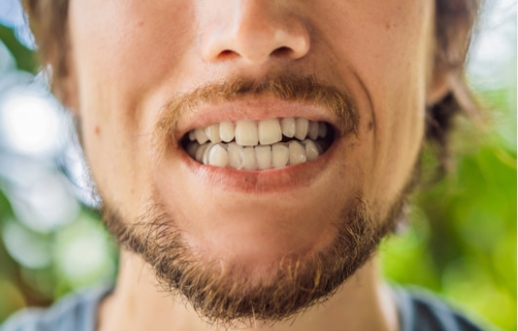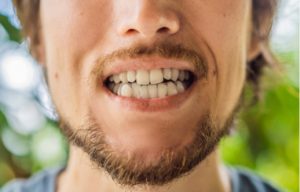If you experience discomfort or pain in your jaw, start noticing if you tend to clench or grind your teeth. Grinding teeth during sleep or even during the day is known as Bruxism in medical terms. And it is a serious issue which can lead to other even more serious dental problems such as:
Pain
Grinding teeth during sleep can last up to 40 minutes per hour, which produces an average of 250 pounds of force per square inch – sufficient to crack a nut. Now imagine how constant force like this can affect your smile. Because of excessive force on mouth and jaw muscles, you can experience discomfort, pain, and headaches.
Worn Out Teeth
Grinding and clenching teeth can have a negative impact on your smile. Over time, teeth tend to wear out, especially the front teeth that get a flat, even look as if smoothed or filed. The teeth also become shorter. Therefore, treating Bruxism as soon as you notice is necessary because the longer it goes untreated, the more noticeable the effects on your teeth become.
Moreover, if you have dental restorations such as crowns or fillings, they tend to wear out, too, if you have the habit of grinding or clenching teeth.
TMJ Pain
Clenching can squeeze the moisture out of the temporomandibular joint. And dry jaw environment can be the onset of jaw joint clicking every time you chew something or open your mouth wide. If you’ve been a bruxism patient for some time now, you must be familiar with the sharp jaw pain, especially in the morning after waking up. This discomfort can continue for a long time, and when not treated with a proper TMJ pain treatment, it can even lead to a locked jaw.
Sensitivity
Enamel is the top layer of teeth that protects them from external damage. However, enamel tends to wear out as we age. Normal wear and tear of teeth in human beings causes an average enamel loss of 0.3 mm every 10 years. And this gets worse in cases of bruxism, exposing patients to problems such as cracking and flaking of teeth. But that’s not all, if the problem isn’t treated, it can cause severe nerve damage. This, coupled with exposed dentin due to enamel erosion, can lead to sensitivity to hot and cold temperatures.
Gum Recession
When you grind teeth, the gum line tends to get affected. The soft tissues in the gum, because of pressure, form pockets where it is easy for bacteria to get accumulated. And this leads to inflamed and irritated gums, which eventually results in oral health issues such as periodontitis and gum recession.
Moreover, Bruxism can result in loss of teeth. Clenching and grinding teeth put stress on the connective tissue of gum, which anchors the teeth in their place. When this tissue gets damaged, the teeth tend to fall out.
How to relieve bruxism?
Stress Management – Bruxism is also the result of stress. If that’s the case, try adopting relaxation practices such as meditation or therapy. Get in touch with a licensed therapist for a long-term solution to the problem. Or you can learn about some effective ways to manage your stress.
Change in Behavior – Talk to your dentist and ask him to suggest the best jaw position. After that, stay conscious so that you can stop yourself from grinding teeth and practice keeping your jaw and mouth in the suggested position.
Muscle Relaxants – Your dentist may prescribe taking muscle relaxants before sleeping for a short period of time so that you do not clench teeth in your sleep.
Mouthguard – Wearing teeth grinding mouthguard can reduce clenching. And eventually, when you get used to the correct jaw position, you can lose the mouth guard.
Untreated Bruxism can lead to migraine and severe dental issues s. So, do not overlook the problem. Talk to your TMJ dentist, who will analyze your problem and suggest the most appropriate solution.
Author Bio:
Shen Chao is part of Dr. Joshua Hong’s Dental Clinic in Goodyear, AZ. While working for the dental clinic, he’s gained first-hand experiences with the questions and concerns that dental patients have, like TMJ disorder. He has been writing to inform people about various dental topics to help his readers improve their oral health. When he’s not working, you can find him on a hiking trail with his dog or having a Sunday cook-out with friends.
ALSO READ:
- 6 Best Home Remedies to Treat Wisdom Tooth Pain
- 7 Home Remedies For Toothache
- 5 Natural Remedies For Gum Disease
- 10 Signs You Need To Visit The Dentist
- 7 Options To Consider When You Have A Missing Tooth









